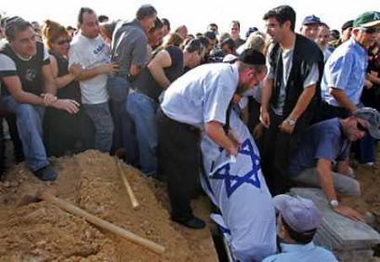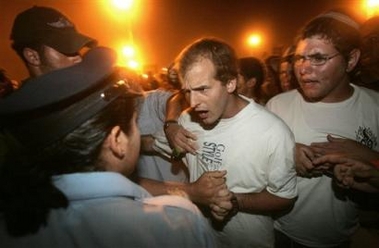|
Israel seals off Gaza Strip settlements
(Agencies)
Updated: 2005-07-14 08:55
Israel sealed off all Jewish settlements in the occupied Gaza Strip on Wednesday to choke resistance to a planned withdrawal from the territory in mid-August, a move that stoked rightist anger.
Meanwhile in the West Bank, Israeli forces retook the city of Tulkarm in an offensive the army said was aimed at the Islamic Jihad group behind a suicide bombing that killed two teenage girls and two women in Israel on Tuesday.
Prime Minister Ariel Sharon signed an order closing Gaza's 21 settlements to non-residents after ultranationalists announced plans for a march that could have brought an influx of thousands of protesters next week.

Relatives and friends of suicide bomb victims Rachel Ben Abu and Nofar Horvitz, both 16 years old, attend their funeral in Tel Aviv on July 13, 2005. A Palestinian suicide bomber killed at least three people at an Israeli shopping mall on July 12 in the first such attack for nearly four months, dealing a heavy blow to a shaky truce. A unit of the Palestinian militant group Islamic Jihad claimed the attack on the coastal city of Netanya, which lies 12 km (8 miles) from the West Bank and has been a frequent target for bombers during an uprising that began in 2000.[Reuters] |
Hundreds of Gaza settlers responded by marching across Kissufim, a crossing on the boundary with Israel. When the settlers refused to show their residency permits, soldiers who had been deployed in force barred their re-entry into Gaza.
"Jews don't expel Jews," the settlers chanted. Many sat down in the sand, vowing to stay put until the closure was revoked.
Protests spread in Israel too. Scores of protestors briefly blocked the Tel Aviv-Jerusalem highway until they were dispersed by police. A suspected far-right activist was arrested after scuffling with bodyguards outside Sharon's office in Jerusalem.

Jewish settlers confront Israeli police as settlers and protesters block the Kissufim crossing point into the Gush Katif bloc of settlements in the southern Gaza Strip late Wednesday, July 13, 2005. [AP] |
Polls show most Israelis back the pullout plan, which Sharon calls "disengagement" from conflict with the Palestinians. But rightist opponents, many of whom claim a biblical birthright to Gaza and the occupied West Bank, say it is a gift to Palestinian militants who have spearheaded attacks during an uprising.
Palestinians fear the plan will give them tiny, impoverished Gaza, while Israel strengthens its hold on much bigger West Bank settlements that house most of the 240,000 settlers. More than 3.6 million Palestinians live in the West Bank and Gaza.
"The Israel Defense Forces will operate a special permit office that will allow Israelis living in the Gaza Strip to file requests for entry for a predefined period of time for their guests (and) relatives," the army said in a statement.
It said the "Restricted Entry Order" was issued to prevent "the uncontrolled entry of extremist elements into the area and in light of efforts to organize a massive march in Gaza."
DISSENT
The closure will give about 9,000 settlers a taste of some of the military restrictions and bureaucracy endured by Palestinians living under occupation.
Settler spokesman Eran Sternberg accused Sharon of "laying siege" to fellow Jews by sealing Gaza's settlements and said the Israeli leader had "hit rock bottom from a moral standpoint."
Rightist protests have included the blockade of highways and planting of fake bombs in train and bus stations.
In a further indication of dissent in the ranks over the pullout, five soldiers face disciplinary hearings after refusing to enforce the Gaza closure. Israel's army chief has said 30 troops have already been disciplined for such insubordination.
In Tulkarm, Israeli troops shot dead a Palestinian policeman in the city, which Israel handed to Palestinian security control four months ago as a peacemaking gesture. Witnesses called the shooting unprovoked. The army said soldiers were returning fire.
"I instructed the security forces yesterday to intensify our operations and to strike as much as possible at the heads of the terrorist organization, Islamic Jihad," Sharon told reporters.
Israeli officials said weeks ago that such assassinations, suspended after Sharon and Palestinian President Mahmoud Abbas declared a ceasefire in February, would resume after a series of rocket attacks on Gaza settlements.
Islamic Jihad has distanced itself from the "calm" it declared with other militant groups. It said the attack in the Israeli city of Netanya, the first such bombing in five months, was in response to Israeli raids to arrest wanted militants.
Abbas called the bombing, carried out by an 18-year-old from a West Bank village under Israeli security control, "idiotic."
|